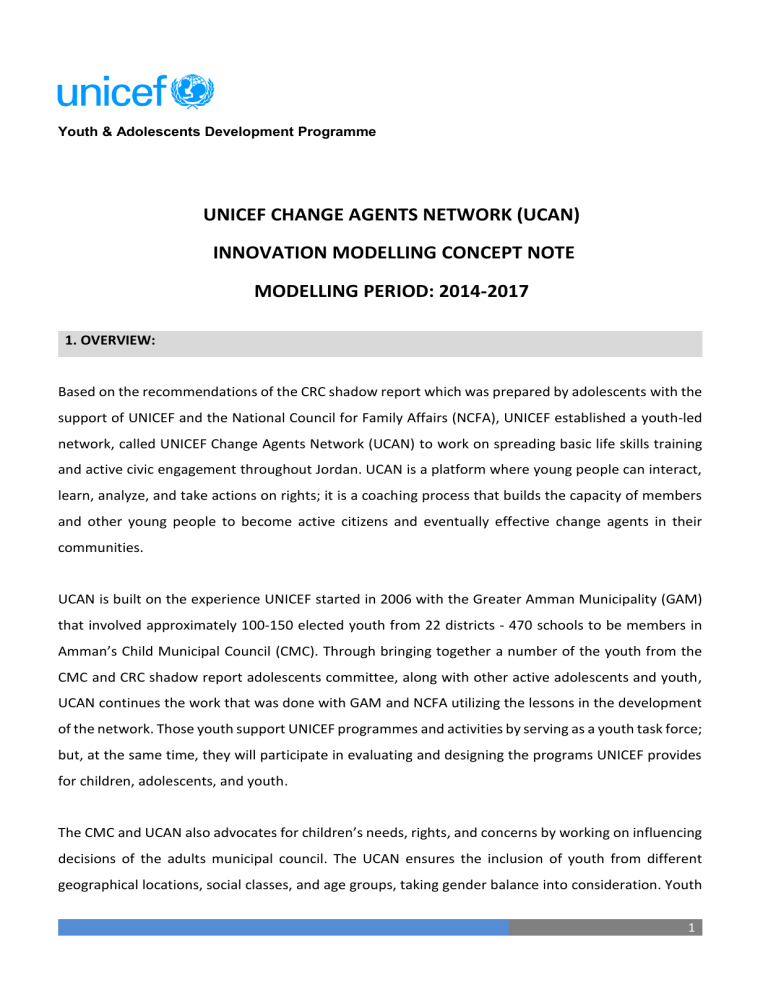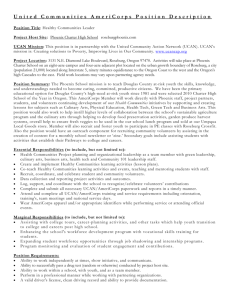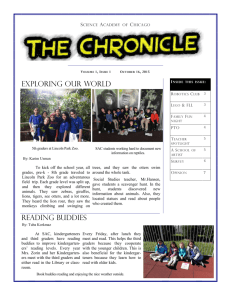
Youth & Adolescents Development Programme UNICEF CHANGE AGENTS NETWORK (UCAN) INNOVATION MODELLING CONCEPT NOTE MODELLING PERIOD: 2014-2017 1. OVERVIEW: Based on the recommendations of the CRC shadow report which was prepared by adolescents with the support of UNICEF and the National Council for Family Affairs (NCFA), UNICEF established a youth-led network, called UNICEF Change Agents Network (UCAN) to work on spreading basic life skills training and active civic engagement throughout Jordan. UCAN is a platform where young people can interact, learn, analyze, and take actions on rights; it is a coaching process that builds the capacity of members and other young people to become active citizens and eventually effective change agents in their communities. UCAN is built on the experience UNICEF started in 2006 with the Greater Amman Municipality (GAM) that involved approximately 100-150 elected youth from 22 districts - 470 schools to be members in Amman’s Child Municipal Council (CMC). Through bringing together a number of the youth from the CMC and CRC shadow report adolescents committee, along with other active adolescents and youth, UCAN continues the work that was done with GAM and NCFA utilizing the lessons in the development of the network. Those youth support UNICEF programmes and activities by serving as a youth task force; but, at the same time, they will participate in evaluating and designing the programs UNICEF provides for children, adolescents, and youth. The CMC and UCAN also advocates for children’s needs, rights, and concerns by working on influencing decisions of the adults municipal council. The UCAN ensures the inclusion of youth from different geographical locations, social classes, and age groups, taking gender balance into consideration. Youth 1 with disabilities in the UCAN activities are a priority, and UNICEF will adapt some activities and trainings to the needs of the youth with disabilities. UNICEF’s Youth and Adolescents section is working on establishing an active and meaningful engagement strategy to include youth and adolescents in community service projects so that they can interact directly with UNICEF and partner programmes on child rights and other related issues. UCAN support extends to all UNICEF programmes including Child protection, Education, as well as Health and Nutrition, where they support campaigns related to these programmes such as the back to school campaign, the vaccination campaign, and disaster risk reduction (DRR) and youth resilience building in Jordan. Collaborative fronts In addition to their work with Jordanian youth and adolescents, UCAN started working on being involved in the emergency programme by working with Syrian youth and adolescents in refugee camps and host communities. Members of UCAN will continue this collaboration with young Syrian refugees living in host communities and engage them in UCAN activities, including campaigns, civic engagement, and basic life skills training. Existing adolescents and youth friendly spaces in refugee camps will be used as venues in implementing UCAN activities, by focusing on social cohesion through collaborative initiatives and resilience building among Jordanian, Palestinian and Syrian youth. UCAN will work with partners from the private sector, NGOs, academia, government, civil society, and youth in facilitating dialogue, identifying issues including pressing challenges facing youth and adolescents in Jordan. UCAN activities and corresponding reports will mobilize actors and provide opportunities for engagement with young people including collaboration in seeking creative ways of addressing the identified challenges and linking young people with policy makers. 2. Innovation in UCAN: Youth in Jordan have limited opportunities to participate in their communities, they are often excluded from taking decisions affecting their lives, and have a very limited say in how their community is managed and shaped. UNICEF is working on giving youth in Jordan the power to advocate and contribute to positive change, create empirical evidence on risks their community faces, and establish 2 common grounds for community and government collaboration on the shared goal of improving living conditions for the community at large. UCAN will work with partners and CBOs to promote inclusive governance through issue-based advocacy that integrates the use of digital technology tools and strategies with traditional advocacy tools. With wider mobilization capacities of digital technologies and new media, this approach will help build awareness on youth rights by increasing youth access to information; mobilizing young citizens and CBOs to report their views and experiences and contribute additional data on social services. Findings from a 2010 assessment conducted to assess the Child Friendly Cities efforts revealed that there is a need for more coordination between the stakeholders, NGOs and GAM as well as a more efficient reporting and tracking structure on issues raised by children and youth in their communities. This initiative will serve as a tool to enable plotting down cases reported in locations around Jordan; it will also serve as a social monitoring and evaluation tool for young citizens and will enable both local and central governments to track their responses and collaboratively undertake actions. Connections UCAN will connect change agents and CBOs to relevant key government bodies (local and national) including policy makers; and, monitor the implementation of changes in government youth policies. Localized sessions for analysis and review of generated reports will provide policy makers with direct opportunities to engage with youth while at the same time be a networking opportunity for young people themselves. UNICEF’s experience in the region and beyond, confirms that when youth are given the proper digital media training and tools they can be influential and effective collaborators with government, can effectively activate and drive change into their communities. Through using new technologies and innovation in UCAN’s work, the network will reach out to communities with the most vulnerable children and youth. Introducing an innovation culture in UCAN, youth will be able to exercise their rights and meaningfully engage as active citizens, particularly in decision-making relating to political, social, economic, educational and cultural policy and planning processes. 3 Various digital tools will be put in place to facilitate communication with, from, and to youth (online digital tools, website, social networking platforms, phone messaging and mobile phone applications).To ensure that these platforms are youth friendly and severing their purpose, youth and adolescents will be at the forefront in designing them facilitated by locally identified facilitators. UCAN will engage with local innovative youth oriented new media institutions to work with adolescents and youth in developing the new digital tools. As Jordan witnesses a remarkable growth in use of mobile telephony among young people and in adoption of new media tools for cross-platform and border-less communication. UCAN will engage young people through the developed tools for wider meaningful social engagement aimed at enhancing their meaningful contributions to society. UCAN Products 1. Interactive Online Portal UCAN plans to develop an interactive Online Portal that will include a youth friendly web forum (website) which will offer a meaningful platform to engage with a wide range of youth (Jordanian, Syrian and Palestinian), partners, and decision makers. Outreach tools like tailored blogs, wikis and Twitter, for example, will help UCAN expand, manage, and activate their volunteer networks. 2. Mobile Application An interactive Mobile Application will be created and linked to the Interactive Online Portal. The application will engage young smartphone users to the wider network of youth and enable cross platform engagement among young people. 3. Interactive Digital Map An interactive digital map will be included in the online portal. The Interactive Digital Map will enable mapping techniques that provide for visualization of UCAN research findings and act as an Interactive Action Research platform. The Interactive Digital Map will facilitate analysis of locations against key existing data (socio-economic) and allow “click through’” to further details and a variety of feedback tools. The interactive digital map will allow filtration by type of issues, location, demographics among others. 4 4. Youth Labs UCAN will support and build one Youth Lab as a model facility for incubation of youth developed innovative ideas and products. The Youth Lab will additionally serve as a knowledge dissemination center on youth led technology applications in Jordan and beyond, showcasing how adolescent and youth development can be harnessed and promoted with the use of technology and new media products. Identified centers will be equipped, Youth Lab youth managers equipped with skills to run them and partnerships developed to ensure the integration of new programming and innovative activities addressing the needs of youth and adolescents in Jordan. All UCAN products will allow youth to collect and share location specific reports in a simple, private, and secure manner. UCAN Branding A UCAN brand will be developed to build confidence among users, partners and collaborators, clearly communicating the UCAN brand, its objectives and how they can get involved. UCAN messaging and distribution channels will be strategically selected to ensure UCAN’s value is understood and its positioning as a “youth crowd sourced” initiative contributing to local youth civic engagement that promotes local action and national good. 3. Sustainability: UNICEF has identified the initiative as a priority for the current country programme 2013-2017. During the modelling period, in co-operation with stakeholders, partners and counterparts, UNICEF will showcase and promote the UCAN products across a wide range of sectors including government, private sector and partners for the scale up phase (2017 plus) Capacity-building of the change agents (youth and adolescents) during the modelling period will ensure a cohort of youth who undertake youth policy engagement among peers, with government, public institutions and civil society and youth related stakeholders throughout the development of UCAN. UNICEF will facilitate targeted trainings of partnering organisations, UCAN members, and youth groups in the field of new social media and online technologies to better achieve their mission 5 Specialised trainings will be delivered to UCAN members to enhance their capacity to run communityled initiatives and in use of digital tools for youth civic engagement. UCAN’s plans will be participatory developed and monitored- enabling efficient and consultative monitoring and evaluation of the activities implemented and verification of achieved results. The processes will include the youth agents and beneficiaries. The portal will post and share lessons learned and experiences which will be disseminated widely to communities, giving other youth groups the chance to replicate initiatives from the shared experiences. UCAN will draw upon application of low-cost, yet practical, and replicable technologies that have wider reach. The Youth Lab has great potential for replication and scale up with possible intake of the concept via existing youth facilities like the USAID-supported “Youth hubs” and the Jordanian Hashemite Fund for Human Development (JOHUD) community youth centers. Outreaches by the Youth Lab to existing Youth Hubs showcasing youth innovation will championing adoption of the Youth Lab concept with potential for national scale up. Ongoing youth leadership promotion activities supported at these youth hubs will benefit from the online and mobile tools developed by UCAN network, increasing the outreach of their activities. UNICEF will also support workshops, trainings and other activities aimed at mobilizing youth hubs into UCAN. UCAN’s design is more about bringing together young members of society and linking them with local and national governance to be able to effectively contribute towards addressing social needs and challenges, than it is about technology- technology is the medium. Budget Summary: Programme Area Mobile App and Interactive mapping and website UCAN Youth Lab Child Friendly Cities expansion Total: Amount (USD) $250,000 $250,000 $500,000 $500,000 $1,500,000 6

